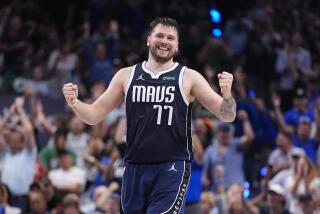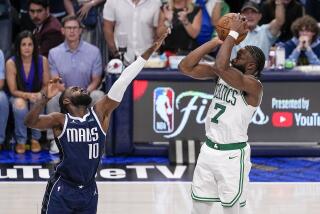Defenses Figure to Dominate as Pistons and Celtics Battle
- Share via
BOSTON — Dignified, professional athletes never allow themselves to wish the worst on opponents. It violates the spirit of sportsmanship. The proper front is to hope that everyone is 100 percent, and may the best team win.
At least, that is usually the public posture. Sometimes, however, athletes will slip and show that they are not that much different from the rest of us.
“Hopefully,” Dennis Rodman said Wednesday, “Larry Bird will have the back spasms again.”
Now that’s the kind of frank, honest talk lay people like to hear. And it’s important to recognize that Rodman was not wishing permanent injury for Bird. There was no evil intent.
He merely was hoping that Bird’s back condition, which forced him to miss Game 1 of the Detroit Pistons-Boston Celtics’ Eastern semifinal series and makes him questionable for Game 2 Thursday, would not improve until, say, June 1. Nothing wrong with that. It is a natural reaction, likely shared by every Pistons’ fan in the world.
None of the Celtics were quite as blunt as Rodman, despite being provided numerous opportunities. The Pistons suddenly seem vulnerable because of the uncertainty of Isiah Thomas’ condition.
Thomas was injured in the fourth quarter of the Pistons’ 86-75 Game 1 victory Tuesday when Boston’s Dee Brown landed on his foot on a drive to the basket. Thomas, who already is playing with a sore left hamstring and still is not fully recovered from wrist surgery, now also has a sprained foot. The Pistons are saying he probably will not play Thursday. If he doesn’t, veteran Gerald Henderson will start in his place.
“For us,” Kevin McHale said, “it’s much better that Gerald Henderson start than it is for Isiah Thomas to start.” Obviously.
The viewing public, however, would be much better served by the presence of a healthy Bird and Thomas. And there are other problems with players who are going to play. McHale and Robert Parish have ankle problems, James Edwards has a bad back, Joe Dumars has a knee problem and Vinnie Johnson has a sore elbow.
The two teams totaled only 161 points in Game 1. It is frightening to think that with so many physical problems, they could actually score less Thursday.
“It’s going to be real ugly,” Rodman said. “People are not going to be interested in it like some of the other games. It’s not going to be pretty.”
And that’s bad news for the Celtics, who have already lost the home-court advantage. They are in a must-win situation because they do not want to go to Detroit trailing 2-0. The Pistons, in fact, have already accomplished their mission in Boston, which is another reason they may choose to keep Thomas out of the game, even if he is able to play.
A low score favors the Pistons, who, even without Thomas, are an accomplished defensive team. Not only did they limit Boston to 75 points -- the fewest the Celtics have ever scored in a playoff game since the 24-second clock was instituted 37 years ago -- but they limited them to 39-percent shooting.
The Celtics were defensive about their shooting, pointing out that the Pistons shot only 38 percent. “Does that mean we played better defense than they did?” asked McHale.
Not really. The Pistons had 17 offensive rebounds; the Celtics had only seven. That enabled Detroit to get 15 more field-goal attempts. The Pistons may have shot worse, but they scored five more baskets, basically the difference in the game.
The Celtics maintained Wednesday that they got the shots they wanted in Game 1. They merely missed them. What they refuse to recognize is that great defensive teams do that to opponents.
“Every team in the last three years has always been able to get what they feel were good shots,” Pistons assistant Brendan Suhr said. “Somebody once said to me that we were so lucky because no one can score a hundred and no one shoots better than 45 percent against us. Yeah, I guess we are lucky. Last year, Michael Jordan’s team scored 74 points against us in Game 7. And they are a great offensive team.”
The point is, the Pistons’ defense is so good that when opponents have bad offensive games, they blame themselves rather than giving the Pistons credit.
But that doesn’t bother the Pistons. They figure that even if Bird is able to play today, they still are going to play great defense. And if he can’t play, they’ll be even better off.
More to Read
Go beyond the scoreboard
Get the latest on L.A.'s teams in the daily Sports Report newsletter.
You may occasionally receive promotional content from the Los Angeles Times.










